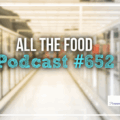If this were my last post, I feel that the most important point that I could leave you with is the fact that sugar is a killer, addictive, drug. Never heard it described like this before?
Well, imagine if you had grown up and every single person around you smoked. Every person in town, every person in your country, in the entire world. E-v-e-r-y-o-n-e smoked. Even though it wasn’t the case throughout history, you wouldn’t think that it was so unusual since every single person did it, right?
Now think about how you may have likely grown up: eating sugar in homemade baked goods, candies, pies, chocolates, cookies, brownies, ice cream, and possibly hordes of fast and processed foods, 99% of which contain sugar in some form or another. It was and currently is a normal part of life for most people, to include sugar in their regular diet.
I didn’t grow up eating a whole lot of fast food, however we did have home-made desserts regularly. If you didn’t have many home-made baked goods it’s no matter; there are a plethora of desserts that can be found in the local bakery, grocery store, or warehouse store, most of which contain corn syrups of some kind, either HFCS, or the “new” crystalline fructose. If they by chance do not contain corn sweeteners, then they contain sugar.
We all know that cigarettes aren’t healthy, and around the world, they are steadily being banned in public places. Just recently Ireland did so, Britain is soon following, and there are major cities in the U.S.A. that have also banned public smoking. Forty to fifty years ago though, people had no idea that cigarettes were bad for them. Today, sugar is an accepted part of life. It is not viewed as anything “horrible” beyond it causing overweight, diabetes, and dental problems. How many think of sugar as the drug that it is?
You may be asking, “how in the world could sugar possibly be classified as a drug?” Did you know that when sugar hits your brain system, that it causes the same chemical reaction that heroin, morphine, and opium do?
Opium, morphine, and heroin and are in a class of drugs called “opioids”, and these drugs affect the beta-endorphin system in the brain. Sugar affects the same system of the brain that these illegal drugs do, causing the same elevation of mood and an increased sense of self-esteem. With the same outcome as what follows the use of opioids, sugar use is followed by a crash in the beta-endorphin system in the brain, causing the user to seek out more of the same substance, thereby resulting in an addiction to sugar (The Sugar Addict’s Total Recovery Program).
According to the Merriam-Webster Dictionary, a drug is a “substance used as a medication or in the preparation of medication”. A narcotic is a “drug (as opium or morphine) that in moderate doses dulls the senses, relieves pain, and induces profound sleep but in excessive doses causes stupor, coma, or convulsions”.
Sugar fits the definition of a drug as a substance used as a medication since it has been used as or in medicine; moreover, both opium and sugar began as medicines (Sugar Blues). Sugar has been used for medicinal purposes throughout history and can still be found today as an ingredient in such items as cough syrups and cough drops. Since sugar causes the same effect in the brain as opium and morphine, it also fits the definition of a narcotic.
In current times as in ancient times, sugar is addictive. It causes a blood sugar spike that is quickly followed by a drop that creates the desire for more sugar. It affects the opiate receptors of the brain releasing endorphins, just as morphine and heroin (both are opiates) do. After the effects have worn off in the brain, another trigger for more sugar is felt.
Sugar is definitely highly addictive, since the user must seek out more of the substance in order to sustain the same feeling provided by the flood of endorphins released in the brain. The user will continue ingesting sugar in order to avoid the symptoms of withdrawal: uncomfortable feelings of emptiness, anxiety, boredom, or depression.
The sugar use cycle continues and brings with it a host of health problems. Rather than quitting the sugar habit, the sugar addict develops such diseases as diabetes, heart disease, high cholesterol, hypertension, obesity, and cancer (Breaking the Food Seduction). Many end up on medications, in the hospital, or worse.
I feel that there needs to be widespread public education on the topic of sugar. I feel that there is too much acceptance of this dangerous, unhealthy, addictive, legal drug, and it is not taken seriously for the drug that it is. I am very passionate about spreading the word to people around the world on this topic, which is why I chose this subject for my “last post”.
On a final note, I would strongly recommend that you read the book Sugar Blues by William Dufty, as well as The Sugar Addict’s Total Recovery Program, so that you may learn more about sugar and its addictive properties.
If you would like to know if you are addicted to sugar, see my previous post for a short quiz that you can take.
Below are people who have so kindly included me in their blog carnivals (listed in no particular order), and who I would now like to tag to participate in this Meme:
- Victor at Victor-Fam.com
- Erek at Verve Coaching
- Laura at The Dragon Slayer’s Guide To Life
- Patrick at New Stasis
- Josh at Josh Bickford’s Reach For Magnificence
- Cindy at Wisdom of Healing
- Aaron at Today is that Day
- Isabella at Change Therapy
Additionally, I would like to tag:
- Lexi at Energies of Creation
- Deb at FIRM This Fanny
If you are a blogger reading this and would like to get in on the fun, just leave me a comment and I will email you the same information that I’ve sent to everyone else listed here. I will also edit this post to include your link. Have fun with blogging your passion!





Hey JoLynn, I really have to say that I’m starting to look forward to your posts…really great stuff… and I don’t say that lightly! $ put aside!
Hi Albert,
Thanks so much!! 🙂
JoLynn
Sugar addiction is a constant struggle for me. It just seems like its everywhere. I find that when I limit my sugar and simple white carbs I have so much more energy. If I do indulge in sugar it seems to take a few days to get it out of my system. Maybe its insulin resistance – ugh.
Thanks for the post and the tag!!
Hi Deb,
I also have much much more energy when I stay off of the refined sugar and flour. It takes me 3 days to get it out of my system, and as long as I stay away from it completely, my cravings for those ingredients are minimal.
Thanks for your comment!
JoLynn